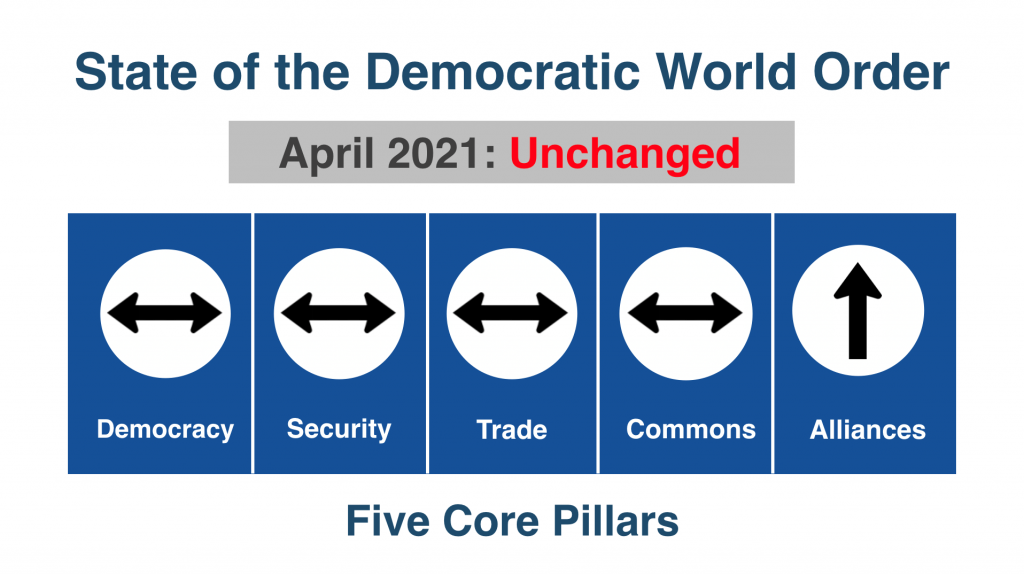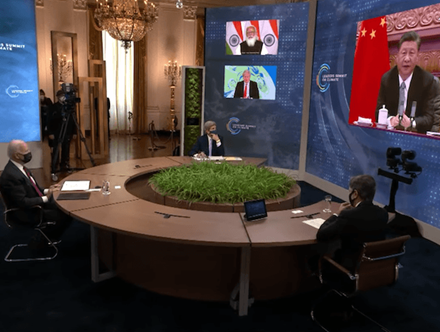Reshaping the order
This month’s topline events
Biden’s Climate Summit. Forty world leaders, including Chinese President Xi Jinping and Russian President Vladimir Putin, participated in a global climate summit convened virtually by President Joe Biden in late April. The United States, the EU, Japan, and several other nations committed to significant reductions in greenhouse gas emissions by 2030, but many other major emitters, including India, Indonesia, and Australia, did not make any significant new commitments.
- Shaping the order. After four years in absentia, the summit showcased the return of American leadership on the climate front. It also provided Biden with his first face-to-face interaction with his Russian and Chinese counterparts, suggesting that despite growing tensions, cooperation in areas such as climate may be within reach. But Chinese Foreign Minister Wang Yi later suggested that Beijing’s cooperation would require that the US “no longer interferes in China’s internal affairs.”
- Hitting Home. Global warming is changing the earth’s climate and environment with increasingly direct consequences for Americans, including higher temperatures, rising sea waters, increased flooding and storms, widespread wildfires, and longer pollen seasons.
- What to do. The US should encourage governments to follow through on their climate commitments, while leading a coordinated effort to harness green energy technologies aimed at ending global reliance on fossil fuels. As the world’s leading emitter, China must do more to reduce greenhouse gases, but the Biden administration should resist Beijing’s attempts to link progress on climate with other aspects of the US-China relationship, including human rights.
India’s COVID Crisis. India became the epicenter of the coronavirus pandemic, as a highly contagious variant triggered a catastrophic new wave, leading to severe oxygen shortages and India’s highest death rate since the pandemic began. While the US, Britain, and other nations began to ship needed medical supplies, including oxygen, therapeutics, and vaccines to India, the escalating rate of infection has overwhelmed India’s struggling health care system.
- Shaping the order. The crisis unfolding in India stands in sharp contrast to the situation in the United States, Europe, and other developed nations, where vaccinations are proceeding at a rapid pace and coronavirus cases and deaths have plunged. Despite the World Health Organization’s COVAX program and vaccine pledges from the US and other G7 nations, much of Asia, Africa, and Latin America will not have enough vaccine supply to immunize the majority of their populations until well into 2022 at the earliest.
- Hitting Home. While cases of the Indian variant have been detected in the United States, the current vaccines appear to be effective at preventing its spread. But the ongoing pandemic limits the ability of Americans to travel safely and potentially do business around the world.
- What to do. With the US on track to provide a vaccine to nearly every American who wants one within a matter of weeks, the Biden administration, in concert with allies and partners, should launch an ambitious, large-scale initiative to swiftly deliver vaccines to the developing world, as a humanitarian gesture and as a strategic investment to bolster American soft power.
US Afghan Pullout. President Biden announced that the US will withdraw all remaining troops from Afghanistan by September 11, the 20th anniversary of the 9/11 attacks. The withdrawal of NATO troops, currently at 9,600 (including 2,500 Americans) will soon follow, amid ongoing peace talks between the Taliban and the Afghan government. The US will continue to provide security assistance and advice to the Afghan government.
- Shaping the order. America’s two-decade investment in Afghanistan was aimed not just at destroying Al-Qaeda’s safe haven, but also supporting the country’s stable transition to democracy and the protection of human rights, particularly for women and girls – long oppressed under the Taliban’s brutal rule. With the Taliban insurgency gaining ground, the withdrawal of American troops will leave the country’s future in the hands of Afghan’s security forces, whose capabilities have been strengthened but remain uncertain.
- Hitting Home. The US and NATO troop commitment in Afghanistan over the past two decades helped keep Americans safe from further terrorist attacks. But with this decision, armed service members and their families will no longer face the prospect of long and potentially dangerous deployments that were required to support the war.
- What to do. With dwindling popular support at home for continuing US combat in Afghanistan, Biden’s decision to withdraw troops is unsurprising. The US will need to bolster other means of support to the Afghan government and be prepared to re-engage militarily if the Taliban threatens the stability of the country or makes significant territorial gains across the country.
Quote of the Month
“I’m encouraged to see so many countries coming together today to fight climate change. It’s the only way to overcome the challenges people face in every part of the world. That’s why it’s also vital that we all work together to strengthen respect for international law [and] reaffirm our collective commitment to human rights…Our collective success depends on finding a better path, not only to a more sustainable future, but to shared peace and prosperity for everyone.”
– Canadian Prime Minister Justin Trudeau

State of the Order this month: Unchanged
Assessing the five core pillars of the democratic world order
Democracy (↔)
- The British parliament declared that China’s sweeping campaign of mass detention, surveillance, forced labor, and forced sterilization against ethnic minorities in Xinjiang is a genocide, joining the US State Department and the Dutch and Canadian parliaments in reaching the same conclusion.
- The US House of Representatives passed legislation that would limit US arms sales to Saudi Arabia as a consequence of the Saudi government’s alleged role in the 2018 killing of US-based dissident and journalist Jamal Khashoggi.
- President Biden revoked US sanctions imposed by the Trump administration on the International Criminal Court, which has a mandate to prosecute individuals for genocide, crimes against humanity, and war crimes.
- Reporters without Borders released their annual Press Freedom Index, indicating that access to information and news coverage is seriously impeded or constrained in 132 of 180 countries surveyed, including in democracies such as Japan, India, and Brazil.
- Overall, the democracy pillar was unchanged.
Security (↔)
- Despite announced plans for a withdrawal, 100,000 Russian remained within striking distance of Ukraine’s eastern border, triggering concerns that the Kremlin may be preparing for a major new offensive. US Secretary of State Blinken announced a visit to Kyiv in early May to show support for Ukraine and warn Russia against any new military incursion.
- On April 15, the Biden Administration imposed extensive new sanctions against Russia for its involvement in hacking US government agencies and companies, interfering in the 2020 US presidential election, and continued occupation of Crimea.
- US officials suspect that Russia was behind directed-energy attacks against US troops in Syria and US diplomats in Cuba and China, causing flu-like symptoms, loss of hearing, and potential long-term brain damage.
- As noted above, the US and NATO will withdraw all remaining troops from Afghanistan by September 11, a move that could embolden the Taliban and places the stability of the Afghan government squarely in the hands of Afghan security forces.
- The Biden administration restricted seven Chinese firms and government labs from accessing US technology, citing their involvement in China’s effort to build supercomputers that help develop nuclear and advanced military weapons.
- Overall, the overall security pillar was unchanged.
Trade (↔)
- Amid growing diplomatic tensions, Australia cancelled two agreements with China that it has signed previously on the Belt and Road Initiative, a move criticized by Beijing as “unreasonable and provocative.”
- The EU and India initiated talks on a new “connectivity” initiative to build joint infrastructure projects around the world as a potential alternative to China’s Belt and Road Initiative.
- While these developments are positive, the overall global trade pillar remained unchanged.
Commons (↔)
- Biden’s climate summit, as noted above, produced significant new commitments, including by the United States and other major emitters, to address the challenge of global warming.
- Also as noted above, India experienced a significant spike of coronavirus cases and deaths with the spread of a more contagious variant, while the US and Europe dramatically expanded vaccine distribution, leading to considerable decreases in cases.
- The UK hosted a meeting of G7 Digital and Technology Ministers, resulting in a joint commitment to cooperate on digital technology standards, free flow of data, and internet safety.
- On balance, the global commons pillar was unchanged.
Alliances (↑)
- President Biden welcomed Japanese Prime Minister Yoshihide Suga to the White House, the first visit by a foreign leader during his presidency, a meeting that underscored the importance of working together with America’s allies in the Indo-Pacific in confronting an increasingly aggressive China.
- NATO began preparations for joint military exercises in Albania, the first large-scale drills in the western Balkans by alliance members since World War II.
- Overall, the alliances pillar was strengthened.
Strengthened (↑)________Unchanged (↔)________Weakened (↓)
What is the democratic world order? Also known as the liberal order, the rules-based order, or simply the free world, the democratic world order encompasses the rules, norms, alliances, and institutions created and supported by leading democracies over the past seven decades to foster security, democracy, prosperity, and a healthy planet.
This month’s top reads
Three must-read commentaries on the democratic order
- Anne Gearan, in the Washington Post, describes Biden’s stark reversal of Trump’s cozying up to dictators and nationalists, while rebuilding relations with democratic allies to confront the larger threats from China and Russia.
- Dhruva Jaishankar and Tanvi Madan contend in Foreign Affairs that the Quad represents the best hope to strengthen economic and security cooperation in light of China’s more assertive actions in the Indo-Pacific.
- Andrew S. Erickson and Gabriel Collins, writing in Foreign Affairs, suggest that the United States should look to compete, not cooperate, with China to tackle the urgent issue of climate change.
Action and analysis by the Atlantic Council
Our experts weigh in on this month’s events
- Fred Kempe, in CNBC, contends that Biden faces a nightmare scenario of stepped up Chinese-Russian strategic cooperation aimed at undermining US influence and Biden’s efforts to rally democratic allies.
- Dan Fried and Ash Jain, contributing to the Atlantic Council’s 100 Ideas for the first 100 days of the Biden administration, argue for a new Atlantic Charter to galvanize democratic leaders from around the world to join together in common cause to defend a rules-based, democratic world order.
- Ash Jain was featured in the New York Times on the G7’s rebranding as a grouping of like-minded democracies, and in Nikkei Asia on Prime Minister Boris Johnson’s efforts to form a D-10.
- On April 14, the Atlantic Council hosted a private strategy session with participants from the US and leading democracies to discuss potential options for a democratic technology alliance, aimed at ensuring the democratic world prevails in the race for advanced technologies that will shape the 21st century global order.
- In an op-ed for CNN, Mathew Burrows and Barry Pavel propose three scenarios for how the COVID-19 pandemic will shape the world in the years to come.
- Dan Fried, writing in Politico, argues that the Biden administration was right to acknowledge the Armenian genocide, in light of America’s role as a champion of human rights.
__________________________________________________
The Democratic Order Initiative is an Atlantic Council initiative aimed at reenergizing American global leadership and strengthening cooperation among the world’s democracies in support of a rules-based democratic order. Sign on to the Council’s Declaration of Principles for Freedom, Prosperity, and Peace by clicking here.
Ash Jain – Senior Fellow
Dan Fried – Distinguished Fellow
Jeffrey Cimmino – Assistant Director
Joel Kesselbrenner – Program Assistant
Paul Cormarie – Georgetown Student Researcher
If you would like to be added to our email list for future publications and events, or to learn more about the Democratic Order Initiative, please email AJain@atlanticcouncil.org.
